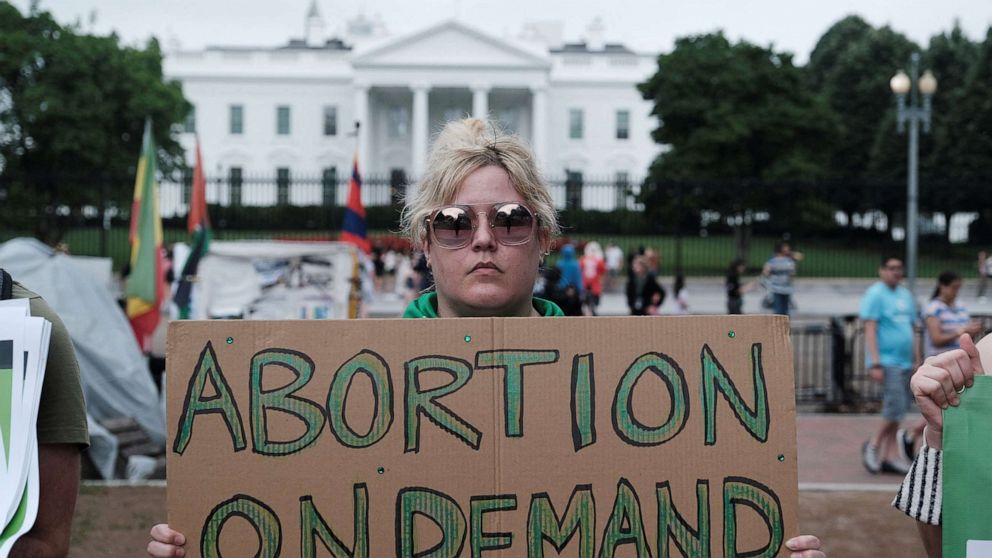
Subscribe to our monthly Philosophy Newsletter and get a Free copy of Understanding Philosophy: The Smart Student's Guide to Reading and Writing Philosophy
I am writing this on the day of a huge protest at the White House demanding action by the president to do more to help women whose right to abortion has been taken away by the US Supreme Court. President Biden said that the Court's decision to overturn Roe v Wade was a "political" decision that can only be reversed by appointing liberal justices to the Court or by electing liberal senators who will vote to codify Roe v. Wade. In other words, we should make another political decision about abortion by replacing pro-life justices with pro-choice justices.
When it is said a decision was made "for political reasons," we usually take this to mean that the decision relates to or is influenced by the ideas or strategies of a particular party or group in politics. Decisions of the president or members of the U.S. Senate to seat judges who will vote for or against proposals to take away the right to abortion are definitely political. These decisions are generally understood to be deeply influenced by the ideas and objectives of the Republican and Democratic parties.
Why is this? Why are judicial decisions about abortion political? What would a non-political judicial decision look like?
In overturning the 1973 precedent case (Roe v Wade) the current conservative court used a theory of interpretation known as “textualism” or “originalism”. This means that the Court should always adhere to the words and intent of the the Framers — that small group of men who signed the Constitution and the representatives of the states who agreed to it.
However, there are several theories of constitutional interpretation known as “non-originalism.” Some of these theories look at the unstated moral principles that give support to the original text. “Privacy” (the right against undue government intrusion into fundamental personal issues and decisions) is the central principle that was used 50 years ago in creating the constitutional right to an abortion. It is now ignored by the current court as irrelevant and the decision of the 1973 Court was branded by Justice Alito as "egregious."
The point I want to make is that this is a battle about theories of interpretation. What theory should be adopted by the court? The Framers of the constitution left no instruction about how their words should be interpreted. This makes the Court very susceptible to politics. Three members of the current court were nominated and approved by a conservative president and Senate. The majority of this court are all believers in originalism and although they vowed to be impartial and respectful of precedent, they were all well-known in their writings and lectures about Roe v Wade to be dismissive of the non-originalist argument that supported this decision.
Politics drives the membership of the court and the judges act accordingly. After the selection of three new judges by a conservative Republican president, we should not be surprised that Roe v Wade fell and women lost their constitutional right to abortion.
How do pro-choice citizens reverse this decision? The suggestion that there might be a non-political theory of constitutional interpretation seems to me to be a fantasy. It would have to be an interpretation of the Constitution adopted by the Court that bore no relation to fundamental ideas about the limits of personal autonomy (women have the right to make decisions about what happens in and to their body) and the meaning of personhood (the human embryo is a person with the right to life).
If there is no persuasive argument for adopting a single theory of constitutional interpretation, there are three ways that the right to an abortion can be restored.
First, as mentioned, the U.S. Senate can vote to codify (make into a federal law) the right to an abortion. Of course, this will be blocked by Republicans who cheered when the Supreme Court overturned Roe v Wade. But if Democrats can win the Senate and get a slim lead in the mid-terms and hang on their narrow lead in the House, they might be able to pass a federal law that obligates every state in the union to allow women to have an abortion.
Second, pro-choicers can try to amend the Constitution with a new bill that guarantees a right to privacy. Of course, pro-lifers might respond with a bill that guarantees a right to life to any being that has human DNA. This tactic is much less likely to work than codification. This is because it takes two-thirds of both Houses of Congress, or, two-thirds of the States request a convention called for the purpose of adopting this right. The proposed amendment must then be ratified by three-fourths of the State legislatures, or three-fourths of conventions called in each State for ratification.
Third. the president might try to "pack" the Court with two or three judges who share his political beliefs. This tactic has been used before but it would succeed only if a few Republican senators broke ranks and voted with Democrats for the recommended judges.
So there you are. My solution? Get out and vote! Change the makeup of your state legislatures and Congress.

No comments:
Post a Comment